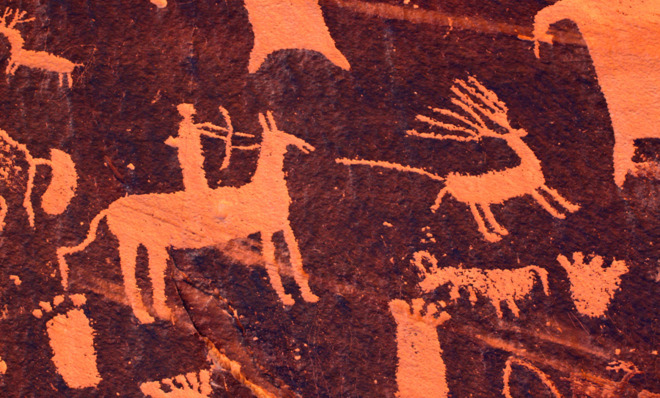The Paleo diet is a horrible way to start the new year
The so-called "caveman diet" ranks dead last in U.S. News & World Report's rankings


A free daily email with the biggest news stories of the day – and the best features from TheWeek.com
You are now subscribed
Your newsletter sign-up was successful
Diet and exercising are on the minds of New Year's resolution-makers nationwide. Not coincidentally, U.S. News & World Report just released its rankings of 32 of the most popular diets. The magazine has good news for adherents (or would-be adherents) of the DASH (Dietary Approaches to Stop Hypertension) Diet Eating Plan, which ranked No. 1 in the overall diet category for the fourth year running.
At the bottom of the list, tied with the Dukan Diet, is a food regimen called the Paleo diet.
For those uninitiated in the way of the "caveman diet," the goal is to eat like the hunters and gatherers of the Paleolithic era. That means lots of meat (including fish and poultry), fruits, and vegetables, and no dairy, legumes, refined sugar, or grains. As U.S. News explains the diet: "If the cavemen didn't eat it, you shouldn't either."
The Week
Escape your echo chamber. Get the facts behind the news, plus analysis from multiple perspectives.

Sign up for The Week's Free Newsletters
From our morning news briefing to a weekly Good News Newsletter, get the best of The Week delivered directly to your inbox.
From our morning news briefing to a weekly Good News Newsletter, get the best of The Week delivered directly to your inbox.
To understand why the Paleo diet ranked dead last among U.S. News' group of health and medical experts, it's worth first noting the criteria they used: A good diet must be effective at weight loss, safe, reasonably easy to follow, nutritious, and protective against diabetes and heart disease. Paleo scored pretty low on all these metrics, from 1.7 (out of 5) on long-term weight loss and ease of use to a high of 2.3 for safety.
Most people are drawn to the Paleo diet for its promises of better health and dropped weight. U.S. News isn't feeling it. Paleo ranks last in the weight-loss category — Weight Watchers gets the No. 1 slot — because, while the magazine's expert panel "gave it slightly higher scores for short-term weight loss than for long-term, on the whole it was by far the least effective diet for weight loss of all those reviewed."
On the healthy eating chart, topped again by the DASH Diet, the judges ruled that Paleo is "one of the few diets that experts actually considered somewhat unsafe and only somewhat complete nutritionally." Paleo didn't come in last here — it tied for 29th with the Dukan Diet ("Possible side effects include lethargy, bad breath, and constipation"). Only the Atkins and Raw Food diets ranked lower.
Paleo also ranked near-last in diabetes prevention and maintenance (31), hearth health (31), and ease to follow (27). In explaining the last-place overall ranking, U.S. News warned that dieters would be well-advised to look elsewhere. The big demerit, though, seems to be practicability. "A true Paleo diet might be a great option: Very lean, pure meats, lots of wild plants," one expert told U.S. News, but following those strictures in the modern era is very difficult. (The similarly high-protein, low-carb Dukan diet was deemed "too restrictive," with one expert calling it "idiotic.")
A free daily email with the biggest news stories of the day – and the best features from TheWeek.com
U.S. News gave the Paleo backers a chance to respond, and Loren Cordain and colleagues at Colorado State University stepped up with a spirited rebuttal, citing five studies that purportedly showed Paleo-type diets "to be superior to Mediterranean diets, diabetic diets, and typical Western diets in regards to weight loss, cardiovascular disease risk factors, and risk factors for type 2 diabetes."
The U.S. News editors dismissed those studies as "small and short, making strong conclusions difficult." And that does seem to be the biggest takeaway from the rankings: Time and time again, the experts said that the lack of research into the Paleo diet made it difficult or impossible to verify the claims made by Paleo proponents. Make of that what you will.
With all due respect, I'm going to go make a bean and cheese burrito.
Peter has worked as a news and culture writer and editor at The Week since the site's launch in 2008. He covers politics, world affairs, religion and cultural currents. His journalism career began as a copy editor at a financial newswire and has included editorial positions at The New York Times Magazine, Facts on File, and Oregon State University.
-
 The 8 best TV shows of the 1960s
The 8 best TV shows of the 1960sThe standout shows of this decade take viewers from outer space to the Wild West
-
 Microdramas are booming
Microdramas are boomingUnder the radar Scroll to watch a whole movie
-
 The Olympic timekeepers keeping the Games on track
The Olympic timekeepers keeping the Games on trackUnder the Radar Swiss watchmaking giant Omega has been at the finish line of every Olympic Games for nearly 100 years
